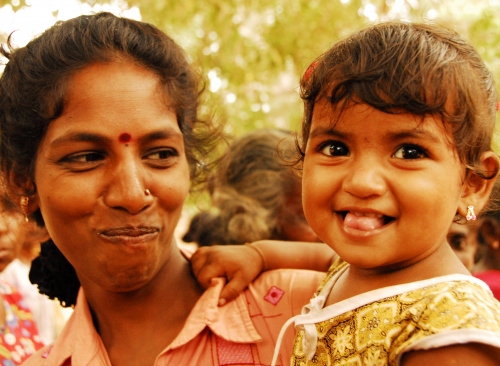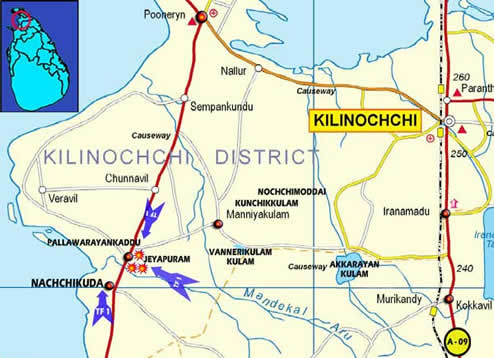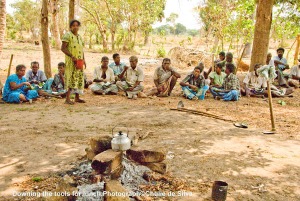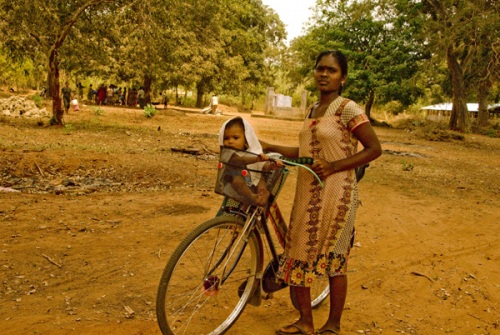Ilankai Tamil Sangam30th Year on the Web Association of Tamils of Sri Lanka in the USA |
||||||||||
 Home Home Archives Archives |
“Whatever We Lost We Will Regain”The North Revives After Conflict in Sri Lankaby Chulie de Silva, The World Bank's End Poverty in South Asia blog, April 12, 2010
Full report of World Bank's Emergency Northern Recovery Project Community Development and Livelihood Improvement Project
They come carrying babies in arms, toddlers in bicycle baskets, the disabled in wheel chairs, the old and the young, to gather under a tree to plan and build back their village and the community. The meeting at Jeyapuram South in the North of Sri Lanka is held under the Cash for Work Program (CfW) a component of the World Bank’s Emergency Northern Recovery Project (ENREP). The meeting of resettled villagers commences with songs of inspiration, with everyone joining in. The voices are strong, they sing in unison, and hands are raised, the spirits revived.
The CfW program is the only source of employment for a large number of the people in most of the resettled villages immediately after their return to their home villages. The program provides incomes to the returning Internally Displaced Persons (IDPs) a minimum of 50 days of employment to rehabilitate their own houses and gardens, clean and repair wells, irrigation canals, roads, drains, schools, mosque and church buildings. The aim of the CfW is to bridge the income gap between the time of return of the returnees (after receiving emergency resettlement provisions) and until the IDPs are able to obtain an income from regular livelihoods. On the road to the resettled villages we could see a flattened and scarred land with only the outside toilets that still stand as sentry posts in a devastated landscape. However, heralding the promise of things to come it was cheering to see the bright patches of fresh green replanted paddy. “Revival of agriculture is vital for communities like ours which were primarily agriculture based farming communities,” says Sinniah Sellayah, in Jeyapuram South. Sellayah belongs to a group of seven in a welfare committee in Jeyapuram. He says there are 31 such groups and the primary need is water for cultivation. After 30 years of not being in use he says the Devankattu water tank needs to be rehabilitated.
Many women have sustained debilitating injuries and have heartbreaking stories of multiple displacements, loss of husbands and children. But they are out in force, actively participating in the CfW program. Thirubakaran Selvi is the Secretary of the Jeyapuram South village rehabilitation committee. “There are 45 single women households in Jeyapuram," says Navi Sellamah, a thin wiry 67 year old who was looking after Kandiah Thevendram in a wheelchair. Asked if she was a relation of Thevendram, Sellamah pauses her betel chewing gives a wry grin and says “We got displaced together, survived together, so now everyone is a relation.” The mid-day meal is cooked by the not so strong. At their invitation we joined the workers when they put down their tools for a meal cooked in an open hearth under the shade of a canopy of trees in Amaithipuram. The meal of chick peas served on freshly picked green leaves for plates washed down with warm sweet tea was delicious. It was not only touching that the little they had they shared with us so warmly. Serving us as very gracious hosts were 35 year old Anna Mary, a mother of five, who lost her husband in the conflict and Sinnappa Anthony Amma another widower. Both had very sad tales to tell but they found smiles for the camera and a request to us to return. “We look for peace and a good education for our children, -- that’s not only me but what everyone here wants” says Rajaratnam Vignarajah cleaning the compound of the school Arokkaipuram Tamil school in Amaithipuram. Although a tailor by profession Vignarajah is working as a labourer under the CfW. a component of the ENREP program. Vignarajah still has splinters in his head from wounds he received during the conflict. He can earn more than the Rs.500 a day he earns now, but stresses the importance of CfW as a vital process that gives the community a sense of direction and commitment.
The belief and trust in education as a path out of poverty ensures that children walk miles mostly barefoot to school over hot dusty roads. Schools lack teachers and facilities but a few committed are again battling to revive schools and give the best to the children. The strong sense of unity and community spirit prevails everywhere. The old and the disabled like Thevendram participate in the CfW program looking after babies while mothers work in the field. ”Whatever we lost we will regain,” says Sellayah emphatically in Jeyapuram. In a corner of the gathering at Jeyapuram a 2 year old girl turns around and steals a kiss from her mother’s friend’s baby. These babies will not remember the conflict, or suffer as their parents did the future is theirs for afresh beginning. It is for us to ensure that the future is bright for them. |
|||||||||
|
||||||||||



